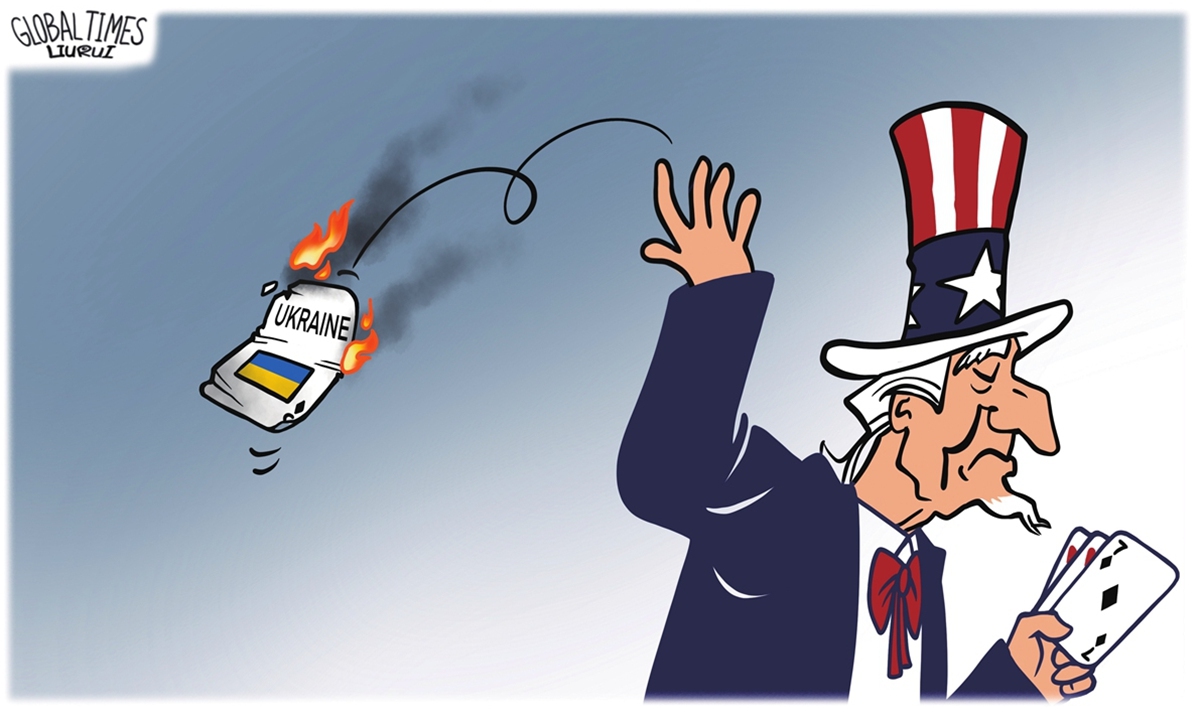
Illustration: Liu Rui/GT
There is a major development. Ukrainian Commander-in-Chief Oleksandr Syrskyi suddenly announced on Saturday his decision to withdraw Ukrainian units from Avdiivka in the Donetsk region. This is the most significant change on the Ukrainian battlefield since May of last year and the latest trend favoring Russian President Vladimir Putin. Russia will hold presidential elections next month, and Putin winning his fifth term is widely anticipated in Western public opinion.
After repeated battles, Russian forces captured the strategic transportation hub of Bakhmut, located north of the city of Donetsk, in May of last year. Since then, Avdiivka has become the new "meat grinder" in this war. The new Ukrainian Commander-in-Chief Syrskyi stated on social media that abandoning Avdiivka was to "avoid encirclement and preserve the lives and health of servicemen." He also emphasized that "Our soldiers performed their military duty with dignity, did everything possible to destroy the best Russian military units, and inflicted significant losses on the enemy in terms of manpower and equipment." Ukraine's President Volodymyr Zelensky said that the troop withdrawal was "a correct decision."
CNN commented that Avdiivka's loss is an undoubted blow to Ukraine. The New York Times described the chaotic situation of the Ukrainian army's retreat from Avdiivka, with one detail stating that the commander ordering they should leave the wounded behind, but "didn't know he was talking to a wounded man."
The retreat of the Ukrainian army from Avdiivka occurred when Joe Biden's request for approval of the foreign aid bill was obstructed by the Republican Party in Congress. The US has always been the largest external sponsor of Kiev, and Biden's requested 2024 aid budget for Ukraine is $60 billion. Zelensky recently received promises of $7.5 billion, $3.2 billion, and $3.1 billion in aid for 2024 from Germany, France, and the UK respectively, which cannot be compared to the $60 billion proposed by the Biden administration. Biden's aid bill for Ukraine has been passed in the Democrat-controlled Senate, but it faces greater obstacles in the Republican-controlled House of Representatives. Although it is not ruled out that it will eventually pass, Western support has become unreliable, and this impression has gradually spread in the overall situation of the Ukrainian war, weakening the confidence and long-term expectations of Kiev and boosting Russia's morale.
The Ukrainian war will reach its two-year mark on February 24, and it has become a typical war of attrition, with the entire West's resources and determination pitted against Russia. So far, Russia has not yet launched a nationwide war mobilization. After American journalist Tucker Carlson recently interviewed Putin in Moscow, he took some footage of the basic situation in the city, showing the shelves in supermarkets filled with a wide range of goods. Carlson directly said to the camera that sanctions haven't worked. On the battlefield in Avdiivka, the Ukrainian side claims that the Russian army's artillery shells are 10 times more than the Ukrainian army's.
Putin stated in the interview with Carlson that Russia will not attack Poland or the three Baltic countries. Although Western leaders criticized his lengthy speech, Europeans' concerns about Russian attacks and use of tactical nuclear weapons have been decreasing for some time. This will affect the long-term, unconditional support of the West for Ukraine. If the war continues to be consumed in this way, with Russia maintaining strong combat capabilities and domestic stability, the West's patience in supporting Ukraine will weaken and some impatience may arise, which is what the Kremlin hopes for. The Ukrainian war will soon enter its third year, becoming a test of endurance. The extent of Russia's endurance will be measured and tested anew.
The author is a Chinese media professional. opinion@globaltimes.com.cn




